unit3outofstep课文翻译综合教程三
- 格式:doc
- 大小:26.50 KB
- 文档页数:4
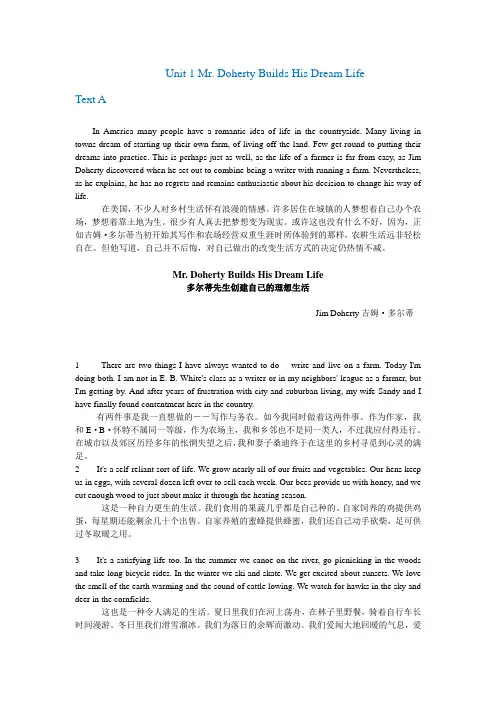
Unit 1 Mr. Doherty Builds His Dream LifeText AIn America many people have a romantic idea of life in the countryside. Many living in towns dream of starting up their own farm, of living off the land. Few get round to putting their dreams into practice. This is perhaps just as well, as the life of a farmer is far from easy, as Jim Doherty discovered when he set out to combine being a writer with running a farm. Nevertheless, as he explains, he has no regrets and remains enthusiastic about his decision to change his way of life.在美国,不少人对乡村生活怀有浪漫的情感。
许多居住在城镇的人梦想着自己办个农场,梦想着靠土地为生。
很少有人真去把梦想变为现实。
或许这也没有什么不好,因为,正如吉姆·多尔蒂当初开始其写作和农场经营双重生涯时所体验到的那样,农耕生活远非轻松自在。
但他写道,自己并不后悔,对自己做出的改变生活方式的决定仍热情不减。
Mr. Doherty Builds His Dream Life多尔蒂先生创建自己的理想生活Jim Doherty吉姆·多尔蒂1 There are two things I have always wanted to do -- write and live on a farm. Today I'm doing both. I am not in E. B. White's class as a writer or in my neighbors' league as a farmer, but I'm getting by. And after years of frustration with city and suburban living, my wife Sandy and I have finally found contentment here in the country.有两件事是我一直想做的――写作与务农。
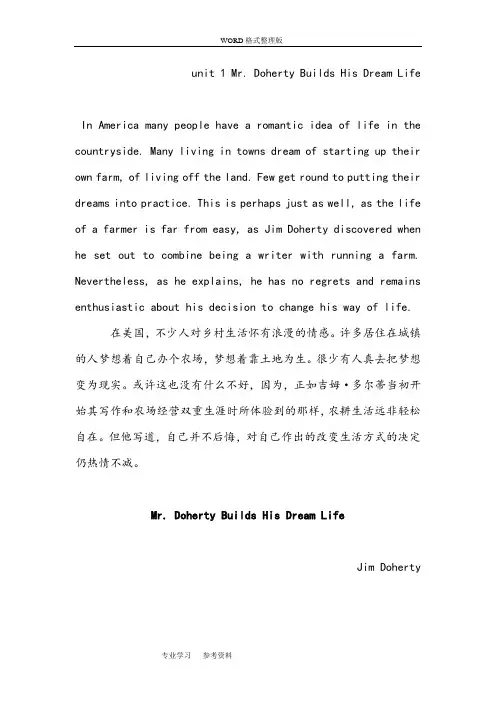
unit 1 Mr. Doherty Builds His Dream LifeIn America many people have a romantic idea of life in the countryside. Many living in towns dream of starting up their own farm, of living off the land. Few get round to putting their dreams into practice. This is perhaps just as well, as the life of a farmer is far from easy, as Jim Doherty discovered when he set out to combine being a writer with running a farm. Nevertheless, as he explains, he has no regrets and remains enthusiastic about his decision to change his way of life.在美国,不少人对乡村生活怀有浪漫的情感。
许多居住在城镇的人梦想着自己办个农场,梦想着靠土地为生。
很少有人真去把梦想变为现实。
或许这也没有什么不好,因为,正如吉姆·多尔蒂当初开始其写作和农场经营双重生涯时所体验到的那样,农耕生活远非轻松自在。
但他写道,自己并不后悔,对自己作出的改变生活方式的决定仍热情不减。
Mr. Doherty Builds His Dream LifeJim Doherty1 There are two things I have always wanted to do -- write and live on a farm. Today I'm doing both. I am not in E. B. White's class as a writer or in my neighbors' league as a farmer, but I'm getting by. And after years of frustration with city and suburban living, my wife Sandy and I have finally found contentment here in the country.多尔蒂先生创建自己的理想生活吉姆·多尔蒂有两件事是我一直想做的――写作与务农。
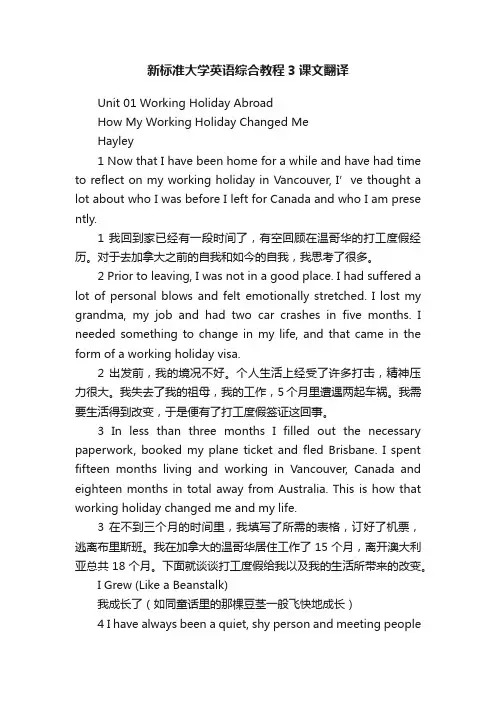
新标准大学英语综合教程3课文翻译Unit 01 Working Holiday AbroadHow My Working Holiday Changed MeHayley1 Now that I have been home for a while and have had time to reflect on my working holiday in Vancouver, I’ve thought a lot about who I was before I left for Canada and who I am prese ntly.1 我回到家已经有一段时间了,有空回顾在温哥华的打工度假经历。
对于去加拿大之前的自我和如今的自我,我思考了很多。
2 Prior to leaving, I was not in a good place. I had suffered a lot of personal blows and felt emotionally stretched. I lost my grandma, my job and had two car crashes in five months. I needed something to change in my life, and that came in the form of a working holiday visa.2 出发前,我的境况不好。
个人生活上经受了许多打击,精神压力很大。
我失去了我的祖母,我的工作,5个月里遭遇两起车祸。
我需要生活得到改变,于是便有了打工度假签证这回事。
3 In less than three months I filled out the necessary paperwork, booked my plane ticket and fled Brisbane. I spent fifteen months living and working in Vancouver, Canada and eighteen months in total away from Australia. This is how that working holiday changed me and my life.3 在不到三个月的时间里,我填写了所需的表格,订好了机票,逃离布里斯班。
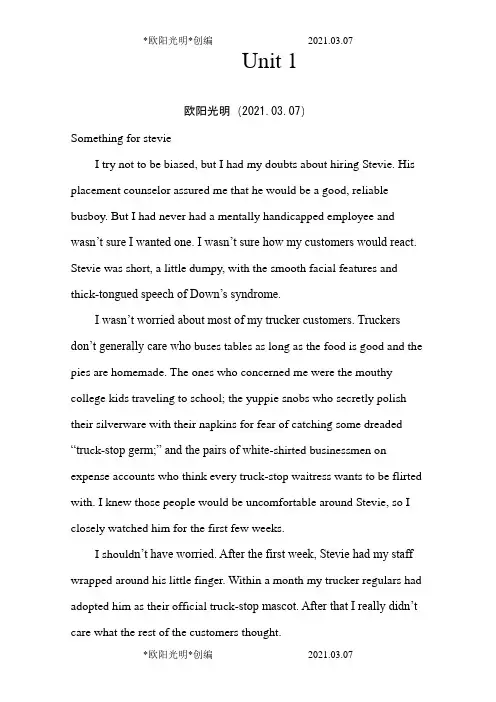
Unit 1欧阳光明(2021.03.07)Something for stevieI try not to be biased, but I had my doubts about hiring Stevie. His placement counselor assured me that he would be a good, reliable busboy. But I had never had a mentally handicapped employee and wasn’t sure I wanted one. I wasn’t sure how my customers would react. Stevie was short, a little dumpy, with the smooth facial features and thick-tongued speech of Down’s syndrome.I wasn’t worried about most of my trucker customers. Truckers don’t generally care who buses tables as long as the food is good and the pies are homemade. The ones who concerned me were the mouthy college kids traveling to school; the yuppie snobs who secretly polish their silverware with their napkins for fear of catching some dreaded “tru ck-stop germ;” and the pairs of white-shirted businessmen on expense accounts who think every truck-stop waitress wants to be flirted with. I knew those people would be uncomfortable around Stevie, so I closely watched him for the first few weeks.I should n’t have worried. After the first week, Stevie had my staff wrapped around his little finger. Within a month my trucker regulars had adopted him as their official truck-stop mascot. After that I really didn’t care what the rest of the customers thought.He was a 21-year-old in blue jeans and Nikes, eager to laugh and eager to please, but fierce in his attention to his duties. Every salt and pepper shaker was exactly in its place, not a bread crumb or coffee spill was visible when Stevie got done with the table.Our only problem was convincing him to wait to clean a table until after the customers were finished. He would hover in the background, shifting his weight from one foot to the other, scanning the dining room until a table was empty. Then he would hurry to the empty table and carefully bus the dishes and glasses onto the cart and meticulously wipe the table with a practiced flourish of his rag. If he thought a customer was watching, his brows would pucker with added concentration. He took pride in doing his job exactly right, and you had to love how hard he tried to please each and every person he met.Over time, we learned that he lived with his mother, a widow who was disabled after repeated surgeries for cancer. They lived on their Social Security benefits in public housing two miles from the truck-stop. Their social worker, who stopped to check on him every so often, admitted they had fallen between the cracks. Money was tight, and what I paid him was probably the difference between them being able to live together and Stevie being sent to a group home.That’s why the restaurant was a gloomy place that morning last August, the first morning in three years that Stevie missed work. He was at the Mayo Clinic in Rochester getting a new valve or something put inhis heart. His social worker said that people with Down’s syndrome often have heart problems at an early age, so this wasn’t unexpected. There was a good chance he would come through the surgery in good shape and be back at work in a few months.A ripple of excitement ran through the staff later that morning when word came that he was out of surgery, in recovery and doing fine. Frannie, my head waitress, let out a war whoop and did a little dance in the aisle when she heard the good news. Belle Ringer, one of our regular trucker customers, stared at the sight of this 50-year-old grandmother of four doing a victory shimmy beside his table. Frannie blushed, smoothed her apron and shot Belle Ringer a withering look.9 He grinned. “OK, Frannie, what was that all about?” he asked.10 “We just got word that Stevie is out of surgery and going to be okay.” she responded.“I was wondering where he was,” said Belle. “I had a new joke to tell him. What was the surgery about?”12 Frannie quickly told him and the other two drivers sitting at his booth about Stevie’s surgery, then sighed. “Yeah, I’m glad he is going to be okay,” she said, “but I don’t know how he and his mom are going to handle all the bills. From what I hear, they’re barely getting byas i t is.” Belle Ringer nodded thoughtfully, and Frannie hurried off to wait on the rest of her tables.After the morning rush, Frannie walked into my office. She had acouple of paper napkins in her hand and a funny look on her face. “What’s up?” I asked. “Th at table where Belle Ringer and his friends were sitting,” she said, “this was folded and tucked under a coffee cup.” She handed the napkin to me, and three $20 bills fell onto my desk when I opened it. On the outside, in big, bold letters, was printed “So mething For Stevie.”“Pony Pete also asked me what that dance was all about,” she said, “so I told him about Stevie and his mom and everything, and Pete looked at Tony and Tony looked at Pete, and they ended up giving me this.” She handed me another paper napkin that had “Something For Stevie” scrawled on its outside. Two $50 bills were tucked within its folds. Frannie looked at me with wet, shiny eyes, shook her head and said simply, “Truckers.”15 That was three months ago. Today is Thanksgiving, the first day Stevie is supposed to be back to work. His placement worker said he’s been counting the days until the doctor said he could work, and it didn’t matter at all that it was a holiday. He called 10 times in the past week, making sure we knew he was coming, fearful that we had forgotten him or that his job was in jeopardy. I arranged to have his mother bring him to work. We met them in the parking lot and invited them both to celebrate his day back.Stevie was thinner and paler, but couldn’t stop grinnin g as he pushed through the doors and headed for the back room where his apronand busing cart were waiting. “Hold up there, Stevie, not so fast,” I said.I took him and his mother by their arms. “Work can wait for a minute. To celebrate you coming back, br eakfast for you two is on me.” I led them toward a large corner booth at the rear of the room. I could feel and hear the rest of the staff following behind as we marched through the dining room. Glancing over my shoulder, I saw booth after booth of grinning truckers empty and join the procession.We stopped in front of the big table, its surface covered with a mess of coffee cups, saucers and dinner plates, all sitting crooked on dozens of folded paper napkins. “First thing you have to do, Stevie, is to cle an up this mess,” I said, trying to sound stern. Stevie looked at me, and then at his mother, then pulled out one of the napkins. It had “Something for Stevie” written on the outside. As he picked it up, two $10 bills fell onto the table. Stevie stared at the money, then at dozens of napkins peeking from beneath the tableware, each with his name printed or scrawled on it.I turned to his mother. “There’s over $10,000 in cash and checks on that table, all from truckers and trucking companies that heard about your problems. Happy Thanksgiving!” Well, it got real noisy about that time, with everybody shouting, and there were a few tears, too. But you know what’s funny? While everybody else was busy shaking hands and hugging each other, Stevie, with a big, big smile on his face, was busy clearing all the cups and dishes from the table — the best worker I ever hired.送给史蒂维的一点心意1 我力求不存偏见,不过在雇用史蒂维时我有理由心存疑虑。
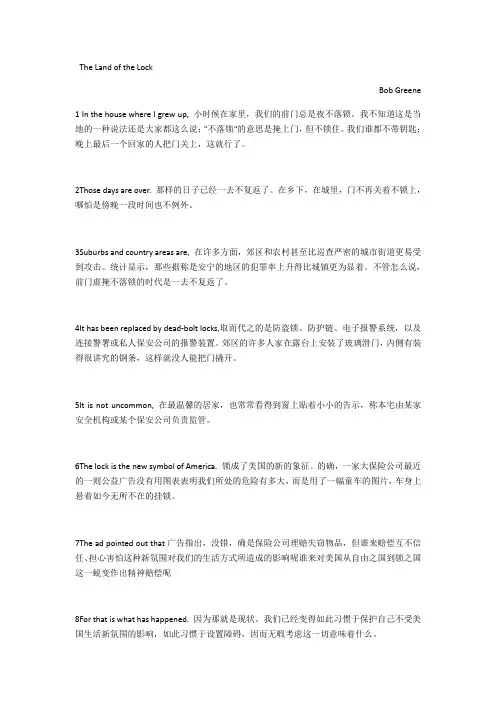
The Land of the LockBob Greene1 In the house where I grew up, 小时候在家里,我们的前门总是夜不落锁。
我不知道这是当地的一种说法还是大家都这么说;"不落锁"的意思是掩上门,但不锁住。
我们谁都不带钥匙;晚上最后一个回家的人把门关上,这就行了。
2Those days are over. 那样的日子已经一去不复返了。
在乡下,在城里,门不再关着不锁上,哪怕是傍晚一段时间也不例外。
3Suburbs and country areas are, 在许多方面,郊区和农村甚至比巡查严密的城市街道更易受到攻击。
统计显示,那些据称是安宁的地区的犯罪率上升得比城镇更为显着。
不管怎么说,前门虚掩不落锁的时代是一去不复返了。
4It has been replaced by dead-bolt locks,取而代之的是防盗锁、防护链、电子报警系统,以及连接警署或私人保安公司的报警装置。
郊区的许多人家在露台上安装了玻璃滑门,内侧有装得很讲究的钢条,这样就没人能把门撬开。
5It is not uncommon, 在最温馨的居家,也常常看得到窗上贴着小小的告示,称本宅由某家安全机构或某个保安公司负责监管。
6The lock is the new symbol of America. 锁成了美国的新的象征。
的确,一家大保险公司最近的一则公益广告没有用图表表明我们所处的危险有多大,而是用了一幅童车的图片,车身上悬着如今无所不在的挂锁。
7The ad pointed out that广告指出,没错,确是保险公司理赔失窃物品,但谁来赔偿互不信任、担心害怕这种新氛围对我们的生活方式所造成的影响呢谁来对美国从自由之国到锁之国这一蜕变作出精神赔偿呢8For that is what has happened. 因为那就是现状。
我们已经变得如此习惯于保护自己不受美国生活新氛围的影响,如此习惯于设置障碍,因而无暇考虑这一切意味着什么。
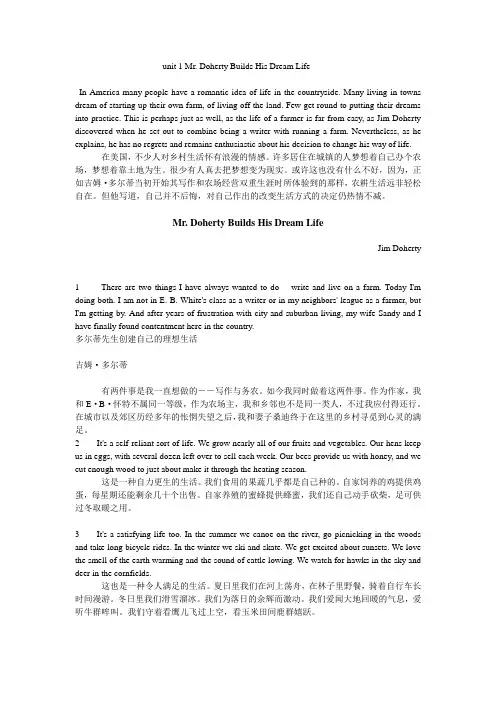
unit 1 Mr. Doherty Builds His Dream LifeIn America many people have a romantic idea of life in the countryside. Many living in towns dream of starting up their own farm, of living off the land. Few get round to putting their dreams into practice. This is perhaps just as well, as the life of a farmer is far from easy, as Jim Doherty discovered when he set out to combine being a writer with running a farm. Nevertheless, as he explains, he has no regrets and remains enthusiastic about his decision to change his way of life.在美国,不少人对乡村生活怀有浪漫的情感。
许多居住在城镇的人梦想着自己办个农场,梦想着靠土地为生。
很少有人真去把梦想变为现实。
或许这也没有什么不好,因为,正如吉姆·多尔蒂当初开始其写作和农场经营双重生涯时所体验到的那样,农耕生活远非轻松自在。
但他写道,自己并不后悔,对自己作出的改变生活方式的决定仍热情不减。
Mr. Doherty Builds His Dream LifeJim Doherty1 There are two things I have always wanted to do -- write and live on a farm. Today I'm doing both. I am not in E. B. White's class as a writer or in my neighbors' league as a farmer, but I'm getting by. And after years of frustration with city and suburban living, my wife Sandy and I have finally found contentment here in the country.多尔蒂先生创建自己的理想生活吉姆·多尔蒂有两件事是我一直想做的――写作与务农。
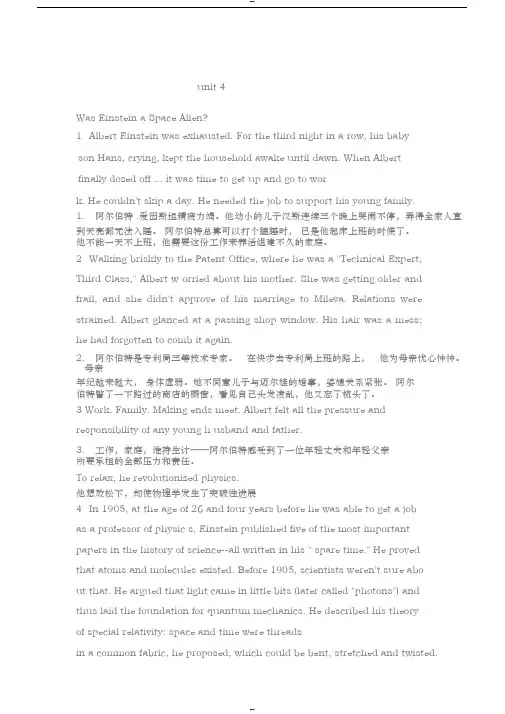
unit 4Was Einstein a Space Alien?1Albert Einstein was exhausted. For the third night in a row, his babyson Hans, crying, kept the household awake until dawn. When Albertfinally dozed off ... it was time to get up and go to work. He couldn't skip a day. He needed the job to support his young family.1.阿尔伯特 .爱因斯坦精疲力竭。
他幼小的儿子汉斯连续三个晚上哭闹不停,弄得全家人直到天亮都无法入睡。
阿尔伯特总算可以打个瞌睡时,已是他起床上班的时候了。
他不能一天不上班,他需要这份工作来养活组建不久的家庭。
2Walking briskly to the Patent Office, where he was a "Technical Expert,Third Class," Albert w orried about his mother. She was getting older andfrail, and she didn't approve of his marriage to Mileva. Relations were strained. Albert glanced at a passing shop window. His hair was a mess;he had forgotten to comb it again.2.阿尔伯特是专利局三等技术专家。
在快步去专利局上班的路上,他为母亲忧心忡忡。
母亲年纪越来越大,身体虚弱。
她不同意儿子与迈尔娃的婚事,婆媳关系紧张。
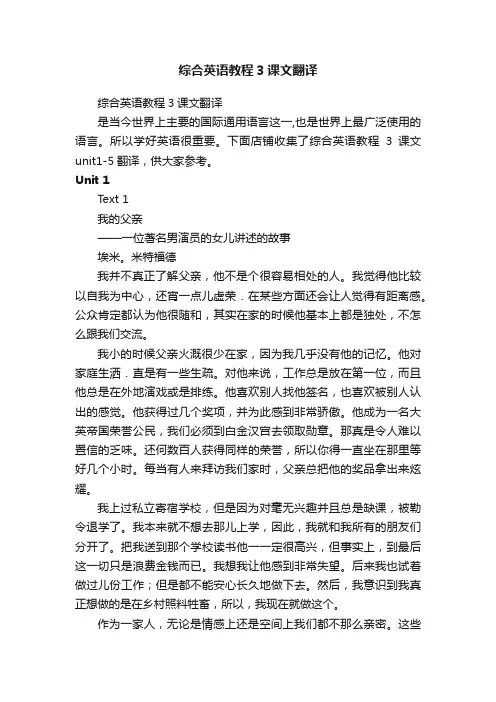
综合英语教程3课文翻译综合英语教程3课文翻译是当今世界上主要的国际通用语言这一,也是世界上最广泛使用的语言。
所以学好英语很重要。
下面店铺收集了综合英语教程3课文unit1-5翻译,供大家参考。
Unit 1Text 1我的父亲——一位著名男演员的女儿讲述的故事埃米。
米特福德我并不真正了解父亲,他不是个很容易相处的人。
我觉得他比较以自我为中心,还宵一点儿虚荣.在某些方面还会让人觉得有距离感。
公众肯定都认为他很随和,其实在家的时候他基本上都是独处,不怎么跟我们交流。
我小的时候父亲火溉很少在家,因为我几乎没有他的记忆。
他对家庭生洒.直是有一些生疏。
对他来说,工作总是放在第一位,而且他总是在外地演戏或是排练。
他喜欢别人找他签名,也喜欢被别人认出的感觉。
他获得过几个奖项,并为此感到非常骄傲。
他成为一名大英帝国荣誉公民,我们必须到白金汉宫去领取勋章。
那真是令人难以置信的乏味。
还何数百人获得同样的荣誉,所以你得一直坐在那里等好几个小时。
每当有人来拜访我们家时,父亲总把他的奖品拿出来炫耀。
我上过私立寄宿学校,但是因为对毫无兴趣并且总是缺课,被勒令退学了。
我本来就不想去那儿上学,因此,我就和我所有的朋友们分开了。
把我送到那个学校读书他一一定很高兴,但事实上,到最后这一切只是浪费金钱而已。
我想我让他感到非常失望。
后来我也试着做过儿份工作;但是都不能安心长久地做下去。
然后,我意识到我真正想做的是在乡村照料牲畜,所以,我现在就做这个。
作为一家人,无论是情感上还是空间上我们都不那么亲密。
这些日子我们彼此很少见面。
我和父亲就像石膏和奶酪’一样完全不同。
我的兴趣一直都在乡村,而他则喜欢书本和音乐,尤其是歌剧,这恰恰是我所讨厌的。
如果他们来看我们,他们的衣着也完全不适合在乡村穿——貂皮大衣和漂亮的但不适合在田间走长路的小皮鞋。
父亲对我结婚更是完全反对。
他一直希望我和我的丈夫分开。
查拉德太卑微了,我想。
而父亲一定是怨让我嫁给一个有名望的人,但我没有。
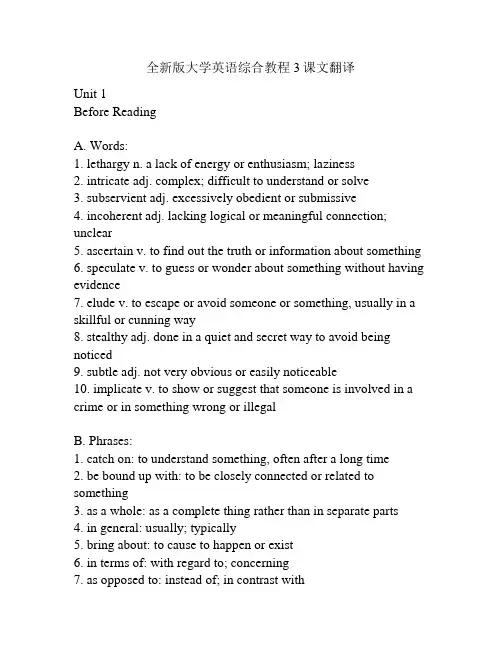
全新版大学英语综合教程3课文翻译Unit 1Before ReadingA. Words:1. lethargy n. a lack of energy or enthusiasm; laziness2. intricate adj. complex; difficult to understand or solve3. subservient adj. excessively obedient or submissive4. incoherent adj. lacking logical or meaningful connection; unclear5. ascertain v. to find out the truth or information about something6. speculate v. to guess or wonder about something without having evidence7. elude v. to escape or avoid someone or something, usually in a skillful or cunning way8. stealthy adj. done in a quiet and secret way to avoid being noticed9. subtle adj. not very obvious or easily noticeable10. implicate v. to show or suggest that someone is involved in a crime or in something wrong or illegalB. Phrases:1. catch on: to understand something, often after a long time2. be bound up with: to be closely connected or related to something3. as a whole: as a complete thing rather than in separate parts4. in general: usually; typically5. bring about: to cause to happen or exist6. in terms of: with regard to; concerning7. as opposed to: instead of; in contrast with8. give rise to: to cause something to happen9. run into: to meet someone you know when you are not expecting to10. break loose: to escape from someone or somethingC. Background Information:The text is from "The Human Condition" by Hannah Arendt, which was published in 1958. Hannah Arendt was a German-born American political theorist who wrote extensively on the topics of totalitarianism, authority, and the nature of power. In this excerpt, Arendt discusses the concept of power in relation to politics and society.Reading SkillsSkim the text and answer the following questions:1. What is the main topic of the text?- The main topic of the text is the nature and significance of power in human society.2. What does the author mean by the "dark permanence of human beings"?- The author means the exceptional and enduring features of human beings that distinguish them from other creatures.3. According to Arendt, what is the relationship between action and power?- According to Arendt, action is the process through which power is manifested and becomes meaningful.4. True or False: According to the author, power is the same as violence.- False. According to the author, power is distinct from violence and can exist without it.5. According to Arendt, what is the danger of the modern age in relation to power?- According to Arendt, the danger of the modern age is the erosion and loss of power due to the rise of bureaucracy and instrumental rationality.6. What does the author mean by the statement "where power is not, there only violence rules"?- The author means that in the absence of power, violence becomes the primary means of obtaining and maintaining control.7. According to the author, how can power be restored or regained in society?- According to the author, power can be restored or regained through the collective actions of individuals who are willing to engage in public life and participate in the political realm. Reading Comprehension1. The main idea of the text is to discuss the nature and significance of power in human society, emphasizing the distinction between power and violence.2. According to Arendt, power is a distinct and essential aspect of human existence, rooted in the ability to act and participate in public life. Power arises from the collective actions of individualswho come together to form a political community. It is characterized by its ability to create something new, bring about change, and affect the course of events. Arendt emphasizes that power is not the same as violence, although they are often mistakenly equated. Power can exist without violence, but violence is a means used when power is absent or diminished.3. The modern age poses a threat to power due to the rise of bureaucracy and instrumental rationality. Bureaucracy tends to undermine power and replace it with administrative and managerial control. Similarly, an excessive reliance on instrumental rationality, with its focus on efficiency and calculation, can erode power by reducing political action to mere means-end calculations.4. Arendt suggests that power can be restored or regained through the collective actions of individuals who are willing to engage in public life and participate in the political realm. This requires active citizens who are willing to take risks, make decisions, and engage in meaningful political action. By coming together and exercising their power, individuals can counteract the dangers of bureaucracy and instrumental rationality, and ensure that power remains a vital force in society.5. The text is primarily informative, presenting the author's analysis and perspective on the nature and significance of power. It is also partially persuasive, as the author argues for the importance of power and the need for active citizen engagement in political life.。
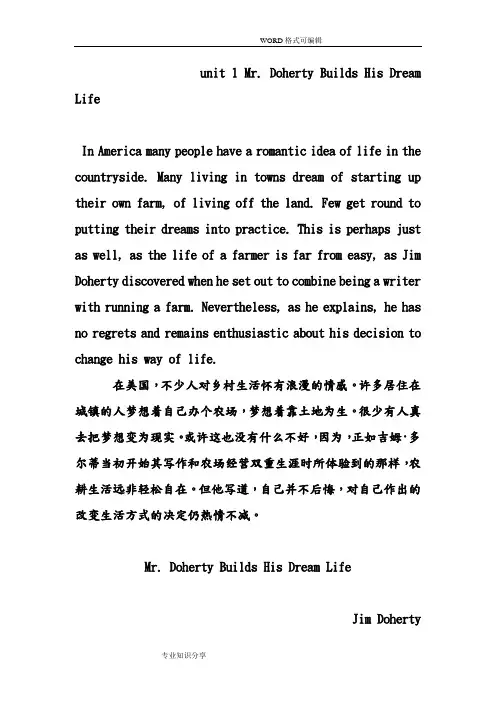
unit 1 Mr. Doherty Builds His Dream LifeIn America many people have a romantic idea of life in the countryside. Many living in towns dream of starting up their own farm, of living off the land. Few get round to putting their dreams into practice. This is perhaps just as well, as the life of a farmer is far from easy, as Jim Doherty discovered when he set out to combine being a writer with running a farm. Nevertheless, as he explains, he has no regrets and remains enthusiastic about his decision to change his way of life.在美国,不少人对乡村生活怀有浪漫的情感。
许多居住在城镇的人梦想着自己办个农场,梦想着靠土地为生。
很少有人真去把梦想变为现实。
或许这也没有什么不好,因为,正如吉姆·多尔蒂当初开始其写作和农场经营双重生涯时所体验到的那样,农耕生活远非轻松自在。
但他写道,自己并不后悔,对自己作出的改变生活方式的决定仍热情不减。
Mr. Doherty Builds His Dream LifeJim Doherty1 There are two things I have always wanted to do -- write and live on a farm. Today I'm doing both. I am not in E. B. White's class as a writer or in my neighbors' league as a farmer, but I'm getting by. And after years of frustration with city and suburban living, my wife Sandy and I have finally found contentment here in the country. 多尔蒂先生创建自己的理想生活吉姆·多尔蒂有两件事是我一直想做的――写作与务农。

全新版大学英语综合教程3课文原文及翻译6-8(共14页)--本页仅作为文档封面,使用时请直接删除即可----内页可以根据需求调整合适字体及大小--unit 6 The Last LeafWhen Johnsy fell seriously ill, she seemed to lose the will to hang on to life. The doctor held out little hope for her. Her friends seemed helpless. Was there nothing to be done约翰西病情严重,她似乎失去了活下去的意志。
医生对她不抱什么希望。
朋友们看来也爱莫能助。
难道真的就无可奈何了吗1 At the top of a three-story brick building, Sue and Johnsy had their studio. "Johnsy" was familiar for Joanna. One was from Maine; the other from California. They had met at a cafe on Eighth Street and found their tastes in art, chicory salad and bishop sleeves so much in tune that the joint studio resulted.在一幢三层砖楼的顶层,苏和约翰西辟了个画室。
“约翰西”是乔安娜的昵称。
她们一位来自缅因州,一位来自加利福尼亚。
两人相遇在第八大街的一个咖啡馆,发现各自在艺术品味、菊苣色拉,以及灯笼袖等方面趣味相投,于是就有了这个两人画室。
2 That was in May. In November a cold, unseen stranger, whom the doctors called Pneumonia, stalked about the district, touching one here and there with his icy fingers. Johnsy was among his victims. She lay, scarcely moving on her bed, looking through the small window at the blank side of the next brick house.那是5月里的事。
Unit1多尔蒂先生创建自己的理想生活——吉姆·多尔蒂有两件事是我一直想做的――写作与务农。
如今我同时做着这两件事。
作为作家,我和E·B·怀特不属同一等级,作为农场主,我和乡邻也不是同一类人,不过我应付得还行。
在城市以及郊区历经多年的怅惘失望之后,我和妻子桑迪终于在这里的乡村寻觅到心灵的满足。
这是一种自力更生的生活。
我们食用的果蔬几乎都是自己种的。
自家饲养的鸡提供鸡蛋,每星期还能剩余几十个出售。
自家养殖的蜜蜂提供蜂蜜,我们还自己动手砍柴,足可供过冬取暖之用。
这也是一种令人满足的生活。
夏日里我们在河上荡舟,在林子里野餐,骑着自行车长时间漫游。
冬日里我们滑雪溜冰。
我们为落日的余辉而激动。
我们爱闻大地回暖的气息,爱听牛群哞叫。
我们守着看鹰儿飞过上空,看玉米田间鹿群嬉跃。
但如此美妙的生活有时会变得相当艰苦。
就在三个月前,气温降到华氏零下30度,我们辛苦劳作了整整两天,用一个雪橇沿着河边拖运木柴。
再过三个月,气温会升到95度,我们就要给玉米松土,在草莓地除草,还要宰杀家禽。
前一阵子我和桑迪不得不翻修后屋顶。
过些时候,四个孩子中的两个小的,16岁的吉米和13岁的埃米莉,会帮着我一起把拖了很久没修的室外厕所修葺一下,那是专为室外干活修建的。
这个月晚些时候,我们要给果树喷洒药水,要油漆谷仓,要给菜园播种,要赶在新的小鸡运到之前清扫鸡舍。
在这些活计之间,我每周要抽空花五、六十个小时,不是打字撰文,就是为作为自由撰稿人投给报刊的文章进行采访。
桑迪则有她自己繁忙的工作日程。
除了日常的家务,她还照管菜园和蜂房,烘烤面包,将食品装罐、冷藏,开车送孩子学音乐,和他们一起练习,自己还要上风琴课,为我做些研究工作并打字,自己有时也写写文章,还要侍弄花圃,堆摞木柴、运送鸡蛋。
正如老话说的那样,在这种情形之下,坏人不得闲――贤德之人也歇不了。
我们谁也不会忘记第一年的冬天。
从12月一直到3月底,我们都被深达5英尺的积雪困着。
unit 1 Mr. Doherty Builds His Dream LifeMr. Doherty Builds His Dream LifeJim Doherty1 There are two things I have always wanted to do -- write and live on a farm. Today I'm doing both. I am not in E. B. White's class as a writer or in my neighbors' league as a farmer, but I'm getting by. And after years of frustration with city and suburban living, my wife Sandy and I have finally found contentment here in the country.多尔蒂先生创建自己的理想生活吉姆·多尔蒂有两件事是我一直想做的――写作与务农。
如今我同时做着这两件事。
作为作家,我和E·B·怀特不属同一等级,作为农场主,我和乡邻也不是同一类人,不过我应付得还行。
在城市以及郊区历经多年的怅惘失望之后,我和妻子桑迪终于在这里的乡村寻觅到心灵的满足。
2 It's a self-reliant sort of life. We grow nearly all of our fruits and vegetables. Our hens keep us in eggs, with several dozen left over to sell each week. Our bees provide us with honey, and we cut enough wood to just about make it through the heating season.这是一种自力更生的生活。
Unit 1Text A 送给史蒂维的一点心意丹·安德森1.我力求不存偏见,不过在雇用史蒂维时我的确心存疑虑。
他的就业顾问向我保证,说他会成为出色、可靠的餐馆杂工。
我从未雇过智障的员工,是否要招收一位,我举棋不定。
我的顾客会有什么反应,我没有把握。
史蒂维是个矮个儿,胖墩墩的,如其他唐氏综合症患者一样,面部光滑,口齿不清。
2.对大多数来就餐的卡车司机们,我还是很放心的。
只要食物好,馅饼地道,他们基本不在乎谁收碗碟。
真正让我担心的是那些高谈阔论的大学走读生,那些因惧怕“路边餐馆的细菌”而用餐巾悄悄擦拭银餐具的雅皮士势利眼儿们,还有那些穿白色衬衫、使用公款消费、认为餐馆里每个女服务员都渴望调情的商务人员。
我知道,史蒂维在这里工作,他们会感到别扭,所以开头几个星期我密切地关注着他。
3.我的担心是多余的。
第一周过后,史蒂维就抓住了我每位员工的心。
不足一个月,我的老顾客−那些卡车司机们−就正式认定史蒂维为卡车司机休息站的吉祥人物。
自此以后,我不再介意其他顾客的看法了。
4.史蒂维21岁,蓝色牛仔裤,耐克运动鞋,满面笑容,讨人喜爱,极端地敬业。
他收拾好一张餐桌后,盐瓶和胡椒瓶归于原位,丝毫不差,桌面不见一点面包屑、一滴咖啡液。
5.我们唯一的问题是得说服他等待客人用餐完毕再去收拾桌子。
他总是在不起眼的地方守候,左右脚替换着支撑体重,眼睛巡视整个餐厅。
一看见哪张餐桌边的客人都离去,他立即赶过去,仔细地把碗碟收拾到餐车上,拿起抹布仔细地擦桌子,动作娴熟、夸张。
要是他觉得有顾客正在看他,他就会眉头紧锁,更加专注。
工作一丝不苟,这是他自豪的源泉。
他取悦面前的每一个人,那煞费苦心的劲头真是惹人喜爱。
6.后来,我们得知史蒂维和母亲一起生活。
他母亲是个寡妇,因患癌症经历多次手术而落下残疾。
母子俩靠社会保险金生活,住在离餐馆两英里以外的廉租房里。
社工人员偶尔登门看望,说他们母子生活着实艰辛贫困。
他们手头拮据,我所付的工资仅能保证母子俩相依为命,史蒂维才不至于沦落到被“集体之家”(为残障人士提供护理的机构)收容。
unit 1 Mr. Doherty Builds His Dream LifeIn America many people have a romantic idea of life in the countryside. Many living in towns dream of starting up their own farm, of living off the land. Few get round to putting their dreams into practice. This is perhaps just as well, as the life of a farmer is far from easy, as Jim Doherty discovered when he set out to combine being a writer with running a farm. Nevertheless, as he explains, he has no regrets and remains enthusiastic about his decision to change his way of life.在美国,不少人对乡村生活怀有浪漫的情感。
许多居住在城镇的人梦想着自己办个农场,梦想着靠土地为生。
很少有人真去把梦想变为现实。
或许这也没有什么不好,因为,正如吉姆·多尔蒂当初开始其写作和农场经营双重生涯时所体验到的那样,农耕生活远非轻松自在。
但他写道,自己并不后悔,对自己作出的改变生活方式的决定仍热情不减。
Mr. Doherty Builds His Dream LifeJim Doherty1 There are two things I have always wanted to do -- write and live on a farm. Today I'm doing both. I am not in E. B. White's class as a writer or in my neighbors' league as a farmer, but I'm getting by. And after years of frustration with city and suburban living, my wife Sandy and I have finally found contentment here in the country.有两件事是我一直想做的――写作与务农。
Chinese Translations of Texts A (Units 1-8)第一单元生活方式的改变课文A在美国,不少人对乡村生活怀有浪漫的情感。
许多居住在城镇的人梦想着自己办个农场,梦想着靠土地为生。
很少有人真去把梦想变为现实。
或许这也没有什么不好,因为,正如吉姆·多尔蒂当初开始其写作和农场经营双重生涯时所体验到的那样,农耕生活远非轻松自在。
但他写道,自己并不后悔,对自己作出的改变生活方式的决定仍热情不减。
多尔蒂先生创建自己的理想生活售姆·多尔蒂有两件事是我一直想做的——写作与务农。
如今我同时做着这两件事。
作为作家,我和E·B·怀特不属同一等级,作为农场主,我和乡邻也不是同一类人,不过我应付得还行。
在城市以及郊区历经多年的怅惘失望之后,我和妻子桑迪终于在这里的乡村寻觅到心灵的满足。
这是一种自力更生的生活。
我们食用的果蔬几乎都是自己种的。
自家饲养的鸡提供鸡蛋,每星期还能剩余几十个出售。
自家养殖的蜜蜂提供蜂蜜,我们还自己动手砍柴,足可供过冬取暖之用。
这也是一种令人满足的生活。
夏日里我们在河上荡舟,在林子里野餐,骑着自行车长时间漫游。
冬日里我们滑雪溜冰。
我们为落日的余辉而激动。
我们爱闻大地回暖的气息,爱听牛群哞叫。
我们守着看鹰儿飞过上空,看玉米田间鹿群嬉跃。
但如此美妙的生活有时会变得相当艰苦。
就在三个月前,气温降到华氏零下30度,我们辛苦劳作了整整两天,用一个雪橇沿着河边拖运木柴。
再过三个月,气温会升到95度,我们就要给玉米松土,在草莓地除草,还要宰杀家禽。
前一阵子我和桑迪不得不翻修后屋顶。
过些时候,四个孩子中的两个小的,16岁的吉米和13岁的埃米莉,会帮着我一起把拖了很久没修的室外厕所修葺一下,那是专为室外干活修建的。
这个月晚些时候,我们要给果树喷洒药水,要油漆谷仓,要给菜园播种,要赶在新的小鸡运到之前清扫鸡舍。
在这些活计之间,我每周要抽空花五、六十个小时,不是打字撰文,就是为作为自由撰稿人投给报刊的文章进行采访。
Unit 3 Out of Step Bill Bryson 1 After living in England for 20 years, my wife and I decided to move back to the United States. We wanted to live in a town small enough that we could walk to the business district, and settled on Hanover, ., a typical New England town — pleasant, sedate and compact. It has a broad central green surrounded by the venerable buildings of Dartmouth College, an old-fashioned Main Street and leafy residential neighborhoods. 2 It is, in short, an agreeable, easy place to go about one’s business on foot, and yet as far as I can tell, virtually no one does. 3 Nearly every day, I walk to the post office or library or bookstore, and sometimes, if I am feeling particularly debonair, I stop at Rosey Jekes Café for a cappuccino. Occasionally, in the evenings, my wife and I stroll up to the Nugget Theatre for a movie or to Murphy’s on the Green for a beer, I wouldn’t dream of going to any of these places by car. People have gotten used to my eccentric behavior, but in the early days acquaintances would often pull up to the curb and ask if I wanted a ride. 4 “I’m going your way,” they would insist when I politely declined. “Really, it’s no bother.” 5 “Honestly, I enjoy walking.” 6 “Well, if you’re sure,” they would say and depart reluctantly, even guiltily, as if leaving the scene of an accident without giving their name. 7 In the United States we have become so habituated to using the car for everything that it doesn’t occur to us to unfurl our legs and see what those lower limbs can do. We have reached an age where college students expect to drive between classes, where parents will drive three blocks to pick up their children from a friend’s house, where the letter carrier takes his van up and down every driveway on a street. 8 We will go through the most extraordinary contortions to save ourselves from walking. Sometimes it’s almost ludicrous. The other day I was waiting to bring home one of my children from a piano lesson when a car stopped outside a post office, and a man about my age popped out and dashed inside. He was in the post office for about three or four minutes, and then came out, got in the car and drove exactly 16 feet (I had nothing better to do, so I paced it off) to the general store6 next door. 9 And the thing is, this man looked really fit. I’m sure he jogs extravagant distances and plays squash and does all kinds of healthful things, but I am just as sure that he drives to each of these undertakings. 10 An acquaintance of ours was complaining the other day about the difficulty of finding a place to park outside the local gymnasium. She goes there several times a week to walk on a treadmill. The gymnasium is, at most, a six-minute walk from her front door. 11 I asked her why she didn’t walk to the gym and do six minutes less on the treadmill. 12 She looked at me as if I were tragically simple-minded and said, “But I have a program for the treadmill. It records my distance and speed and calorie burn rate, and I can adjust it for degree of difficulty.” 13 I confess it had not occurred to me how thoughtlessly deficient nature is in this regard. 14 According to a concerned and faintly horrified 1997 editorial in the Boston Globe, the United States spent less than one percent of its transportation budget on facilities for pedestrians. Actually, I’m surprised it was that much. Go to almost any suburb developed in the last 30 years, and you will not find a sidewalk anywhere. Often you won’t find a single pedestrian crossing. 15 I had this brought home to me one summer when we were driving across Maine and stopped for coffee in one of those endless zones of shopping malls, motels, gas stations and fast-food places. I noticed there was a bookstore across the street, so I decided to skip coffee and head over. 16 Although the bookshop was no more than 70 or 80 feet away, I discovered that there was no way to cross on foot without dodging over six lanes of swiftly moving traffic. In the end, I had to get in our car and drive across. 17 At the time, it seemed ridiculous and exasperating, but afterward I realized that I was possibly the only person ever to have entertained the notion of negotiating that intersection on foot. 18 The fact is, we not only don’t walk anywhere anymore in this country, we won’t walk anywhere, and woe to anyone who tries to make us, as the city of Laconia, ., discovered. In the early 1970s, Laconia spent millions on a comprehensive urban renewal project, which included building a pedestrian mall to make shopping more pleasant. Esthetically it was a triumph— urban planners came from all over to coo